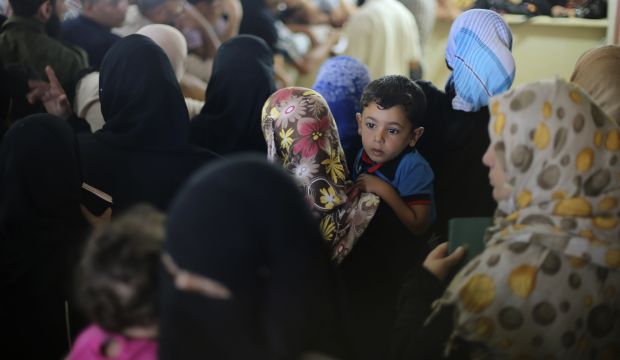
A Palestinian boy, hoping to cross into Egypt with his family, is held by his mother as they wait at the Rafah crossing between Egypt and the southern Gaza Strip on August 12, 2014. (Reuters/Ibraheem Abu Mustafa)
Ramallah and Cairo, Asharq Al-Awsat—Hamas announced its agreement on allowing the Palestinian Authority (PA) to take control of Gaza’s border crossings on Monday, clearing the way for indirect peace talks with the Israeli government to continue.
The demand was one of Israel’s main conditions at the indirect Palestinian–Israeli negotiations in Cairo in order to agree on an end to the Gaza crisis. Hamas also agreed to allow the PA to take charge of the reconstruction operation in Gaza after hostilities cease, in order to encourage Israel to lift its embargo of the territory, Hamas’s central objective.
Izzat Al-Rashq, a member of Hamas’ political bureau and one of those present on its Cairo delegation, said the movement had no objections to the PA taking charge of the reconstruction of Gaza and implementing all agreements. He expressed Hamas’ readiness to hand over the supervision of the Rafah crossing to the PA, as well as the other border crossings on the Gaza Strip.
The Palestinian delegation has discussed an action plan to reopen the border crossings, including the Rafah crossing. The plan will be presented later to the Egyptians and Israelis when talks resume on Tuesday.
The talks in Cairo resumed on Monday following the return of the Israeli delegation to the Egyptian capital, a few hours after the start of a new 72-hour ceasefire between both sides, which appeared to be holding on Tuesday.
Egyptian sources told Asharq Al-Awsat that both the Palestinian and Israeli sides showed some flexibility in their positions, which promised a breakthrough in the negotiations.
The sources said the flexibility of the two sides was due to the pressure imposed on them by regional and international powers to agree to “compromises” in order to reach a final formula for the resolution of the crisis.
According to press reports, Israeli negotiators offered to ease the restrictions on food trucks travelling into the Strip, and allow the PA to transfer funds from the West Bank to public employees in Hamas-ruled Gaza. In return, the Israelis demanded that measures be introduced to curb arms smuggling in the territory.
One member of the Palestinian negotiating team in Cairo, Qais Abdul Karim, also known as “Abu Layla,” accused Israel of negotiating in bad faith.
He told Asharq Al-Awsat that the Israelis wanted “to resume the restrictions which existed over what used to be known as dual-use materials and impose a maximum number on the movement of individuals . . . This is a [re]organization of the siege, not lifting it at all.”
Ahmad Al-Ghamrawi contributing reporting from Cairo.

Trackbacks/Pingbacks